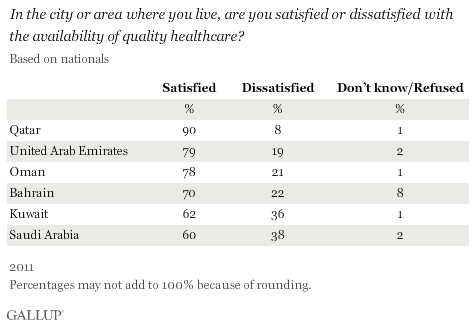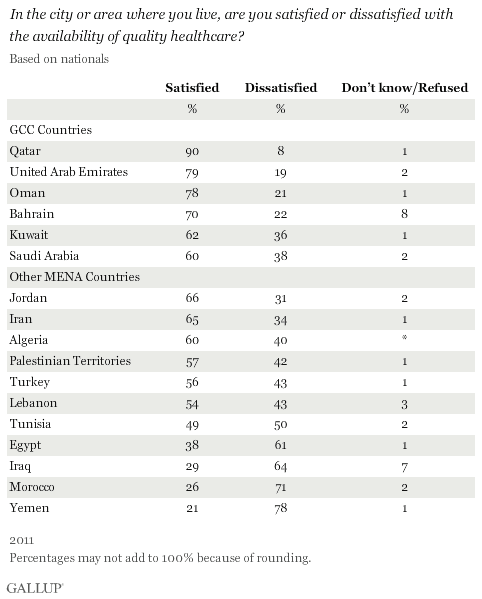WASHINGTON, D.C. -- Majorities of nationals and Arab expats living in Gulf Cooperation Council (GCC) countries say they are satisfied with the availability of quality healthcare in the city or area where they live. Six in 10 or more respondents express satisfaction with the availability of quality care, with satisfaction highest in Qatar (90%) and lowest in Kuwait (62%) and Saudi Arabia (60%).

GCC populations are growing and residents are living longer than ever. But obesity and diabetes are increasing in these countries, too. For example, the World Health Organization forecasts the prevalence of diabetes to almost triple in countries such as Bahrain, Kuwait, Oman, and Saudi Arabia and more than double in Qatar and the United Arab Emirates between 2000 and 2030. Additionally, research shows that anywhere between two-thirds to three-quarters of adults are overweight or obese in Kuwait, Qatar, Saudi Arabia, and Bahrain -- a likely effect of "nutrition transition," or the increases in nutritional health problems and related diseases coinciding with economic growth in the Gulf region. These factors, along with the higher healthcare spending that accompanies them, will likely test this relatively healthy satisfaction with access to quality care.
Currently, though, these levels of satisfaction compare favorably with those of the national populations in many other Middle East and North Africa (MENA) countries and areas expected to face a healthcare crush in coming years. Between one-half and two-thirds of residents in Jordan, Iran, Algeria, the Palestinian Territories, Turkey, and Lebanon are satisfied with local access to quality healthcare. Satisfaction is about half as high in Egypt, Iraq, Morocco, and Yemen. But unlike their GCC neighbors, many of these countries do not have the financial resources to foot the bill for the rising need for quality care.

Bottom Line
Governments in GCC countries have recently upped their investments in the healthcare industry. This includes subsidizing a large percentage of nationals and expats' care needs, even if that means covering the costs for medical tourism to other countries. Improvements in the availability of quality care over the past few decades and these more recent investments may help explain relatively high satisfaction with access to quality healthcare in these countries.
But people in GCC countries are experiencing serious health challenges now -- including obesity, diabetes, and heart disease -- that demonstrate the need for additional investment. State governments in the GCC must consider strategies for meeting increasing care needs and improving the quality of healthcare. Possible solutions include further development of private care options for nationals and expats. Privatization of care in these countries comes with other challenges, though, such as staffing, quality oversight, and the economics of reimbursement and insurance in a public-private healthcare system.
For complete data sets or custom research from the more than 150 countries Gallup continually surveys, please contact SocialandEconomicAnalysis@gallup.com or call 202.715.3030.
Survey Methods
Results are based on face-to-face interviews with 1,000 nationals and Arab expats, aged 15 and older, conducted in 2011 in Algeria, Bahrain, Egypt, Iran, Iraq, Jordan, Kuwait, Lebanon, Morocco, Oman, Palestinian Territories, Qatar, Saudi Arabia, Tunisia, Turkey, the United Arab Emirates, and Yemen. For results based on the total sample of national adults, one can say with 95% confidence that the maximum margin of sampling error ranged from ±3.3 percentage points to ±3.9 percentage points. The margin of error reflects the influence of data weighting. In addition to sampling error, question wording and practical difficulties in conducting surveys can introduce error or bias into the findings of public opinion polls.
For more complete methodology and specific survey dates, please review Gallup's Country Data Set details.
